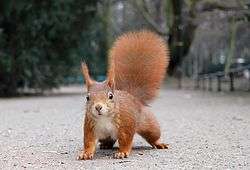squirrel
English

A squirrel
Etymology
From Middle English squirel, squyrelle, from Anglo-Norman esquirel and Old French escurel (whence French écureuil), from Vulgar Latin *scūriolus, diminutive of *scūrius, variant of Latin sciurus, from Ancient Greek σκίουρος (skíouros). Displaced native Middle English acquerne, aquerne, from Old English ācweorna.
Pronunciation
- (Received Pronunciation, General Australian, UK) IPA(key): /ˈskwɪɹl̩/, /ˈskwɪɹəl/
- (Canada, US) IPA(key): /ˈskwɝl/, /ˈskwɝl̩/, /ˈskwɝəl/
- (New England, very dated) IPA(key): /ˈskwɪɹəl/
Audio (Canada) (file) - Rhymes: -ɜː(ɹ)l, -ɪɹəl
Noun
Wikispecies squirrel (plural squirrels)
- Any of the rodents of the family Sciuridae distinguished by their large bushy tail.
- 1865, Henry David Thoreau, Cape Cod, Chapter IX. "The Sea and the Desert", page 187.
- He also said that minks, muskrats, foxes, coons, and wild mice were found there, but no squirrels.
- 1865, Henry David Thoreau, Cape Cod, Chapter IX. "The Sea and the Desert", page 187.
- (Scientology, often derogatory) A person, usually a freezoner, who applies L. Ron Hubbard's technology in a heterodox manner.
- One of the small rollers of a carding machine which work with the large cylinder.
Synonyms
- scug (provincial)
Derived terms
- gray squirrel
- red squirrel
- squirrel friend
Translations
rodent
|
|
Verb
squirrel (third-person singular simple present squirrels, present participle squirreling, simple past and past participle squirreled)
- (transitive) To store in a secretive manner, to hide something for future use
Usage notes
- In addition to the single-L forms squirreling and squirreled given above, the less-common double-L forms squirrelling and squirrelled are also attested in UK usage.
Derived terms
This article is issued from
Wiktionary.
The text is licensed under Creative
Commons - Attribution - Sharealike.
Additional terms may apply for the media files.